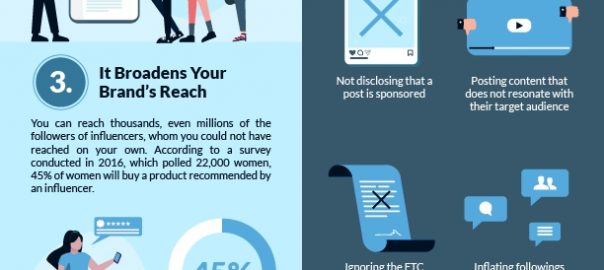Word-of-mouth marketing is powerful because it can help you build trust and credibility. When a potential buyer sees someone they like or look up to, using your product, they may want it too. That’s what makes influencer marketing a powerful tool.
80% of marketers consider it effective while 89% of them said that it generates ROI that is comparable to or better than what other marketing channels do.
But, influencer marketing has its own set of cons too.
Let’s discuss the pros and cons of influencer marketing so that you can make an informed decision about whether or not to invest in influencer marketing.
The Pros of Influencer Marketing
Influencer marketing can make it easier for you to develop relationships with potential customers.
Other benefits of using influencer marketing are:
Target the Right People
If you find the right influencer from your niche, you can easily market your products and services to your ideal buyers.
For example, a cosmetic company can partner with beauty bloggers to target people who are likely to be interested in their products.
Builds Trust and Credibility
People tend to trust information coming from people they like and follow on social media.
A majority of influencers work hard every day to build a community of people who trust them and keep them engaged. When they endorse your brand, their followers are likely to try your products out.
The Cons of Influencer Marketing
Will your influencer focus on promoting your brand to relevant audiences?
Will they really put in the effort to create content that can get people to trust your brand?
If not, they may end up hurting your marketing budget.
What else?
Partnering with the Wrong Influencer
If your influencer receives a backlash from people because of an inappropriate image, caption, or comment, it may hurt your brand’s reputation as well.
What if something negative they did in the past resurfaces?
The smallest mistake in selecting influencers can have a negative impact on your influencer campaign and brand.
Not Following the FTC Guidelines
When an influencer publishes sponsored content, they need to disclose their partnership with the brand. In case, they do not so so, it can lead to the violation of the FTC’s endorsement guidelines.
For more pros and cons of influencer marketing, check out the infographic below.
![Pros and Cons to Consider Before Investing in Influencer Marketing [Infographic] Pros and Cons to Consider Before Investing in Influencer Marketing [Infographic]](https://www.onlinesalesguidetip.com/wp-content/uploads/2020/06/Pros-and-Cons-to-Consider-Before-Investing-in-Influencer-Marketing-Infographic-scaled.jpg)
Infographic via ShaneBarker.com
Digital & Social Articles on Business 2 Community
(98)
Report Post




